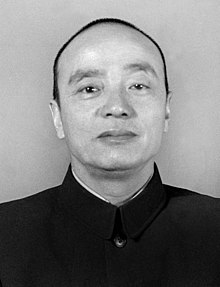
Back يانج شانج كون Arabic Yang Shangkun AST Yang Shangkun Aymara ইয়াং শাংখুন Bengali/Bangla ཡང་ཧྲང་ཁུན། Tibetan Yang Shangkun Catalan Jang Šang-kchun Czech Yang Shangkun German Yang Shangkun Spanish Yang Shangkun Basque
Yang Shangkun | |
|---|---|
| 杨尚昆 | |
 | |
| 4th President of the People's Republic of China | |
| In office 8 April 1988 – 27 March 1993 | |
| Premier | Li Peng |
| Vice President | Wang Zhen |
| Leader | Deng Xiaoping |
| Preceded by | Li Xiannian |
| Succeeded by | Jiang Zemin |
| Vice Chairman of the Central Military Commission | |
| In office State Commission: 20 June 1983 – 28 March 1993 Party Commission: 12 September 1982 – 19 October 1992 | |
| Chairman | Deng Xiaoping Jiang Zemin |
| Secretary-General of the CCP Central Military Commission | |
| In office August 1945 – November 1956 | |
| Succeeded by | Huang Kecheng |
| In office July 1981 – November 1989 | |
| Preceded by | Geng Biao |
| Succeeded by | Yang Baibing |
| Director of the Office of the General Secretary of the Chinese Communist Party | |
| In office 24 October 1945 – 10 November 1965 | |
| Chairman | Mao Zedong |
| Preceded by | Li Fuchun |
| Succeeded by | Wang Dongxing |
| Member of the National People's Congress | |
| In office 21 December 1964 – 13 January 1975 | |
| Constituency | PLA At-large |
| In office 25 March 1988 – 15 March 1993 | |
| Constituency | Sichuan At-large |
| 7th Mayor of Guangzhou | |
| In office March 1979 – September 1981 | |
| Preceded by | Jiao Linyi |
| Succeeded by | Liang Lingguang |
| Personal details | |
| Born | 3 August 1907 Tongnan, Chongqing, Sichuan, Qing Empire |
| Died | 14 September 1998 (aged 91) Beijing, People's Republic of China |
| Nationality | Chinese |
| Political party | Chinese Communist Party (joined in 1926) |
| Spouse |
Li Bozhao
(m. 1929; died 1985) |
| Relations | Yang Baibing |
| Children | 3 |
| Alma mater | Shanghai University, Moscow Sun Yat-sen University |
| Yang Shangkun | |||||||||||
|---|---|---|---|---|---|---|---|---|---|---|---|
| Simplified Chinese | 杨尚昆 | ||||||||||
| Traditional Chinese | 楊尚昆 | ||||||||||
| |||||||||||


Yang Shangkun (3 August 1907[1] – 14 September 1998) was a Chinese Communist military and political leader, president of the People's Republic of China from 1988 to 1993, and one of the Eight Elders that dominated the party after the death of Mao Zedong.[2]
Born to a prosperous land-owning family, Yang studied politics at Shanghai University and Marxist philosophy and revolutionary tactics at Moscow Sun Yat-sen University. He went on to hold high office under both Mao Zedong and later Deng Xiaoping; from 1945 to 1965 he was Director of the General Office and from 1945 to 1956 Secretary–General of the Central Military Commission (CMC). In these positions, Yang oversaw much of the day-to-day running of government and Party affairs, both political and military, amassing a great deal of bureaucratic power by controlling things like the flow of documents, the keeping of records, and the approval and allocation of funds.[2] Purged, arrested and imprisoned during the Cultural Revolution, he spent 12 years in prison but staged a comeback in 1978, becoming a key ally of Deng, serving as Mayor of Guangzhou (1979–81), and returning to the CMC as Secretary–General and also Vice Chairman (1981–89), before assuming the presidency.[2]
One of the earliest supporters of Chinese economic reform, Yang justified it with references to Vladimir Lenin and the New Economic Policy. However, he strongly opposed any form of political reform, and, despite his own suffering during the Cultural Revolution, actively defended the image and record of Mao. Together with his half-brother, General Yang Baibing, Yang Shangkun effectively controlled the PLA for the entire 1980s and into the early 1990s. Despite his initial hesitation, he went on to play a leading role in crushing the 1989 Tiananmen Square protests and was actually the one who planned and supervised the operations to clear the square and surrounding streets. Yang's downfall came in 1993, when he failed in his attempts to undermine the new leadership of Jiang Zemin and to retain control of the PLA, and was forced to retire by a coalition of Party elders, including Deng himself.
- ^ "族谱帮大忙,确定杨尚昆诞辰日为8月3日--中国共产党新闻--中国共产党新闻-人民网". Archived from the original on 4 March 2016. Retrieved 21 May 2017.
- ^ a b c Yang Shangkun (Yang Shang-kun) (1907-1998) in China at war: an Encyclopedia, edited by Xiaobing Li, pp. 512–514, ABC-CLIO, 2012.
© MMXXIII Rich X Search. We shall prevail. All rights reserved. Rich X Search